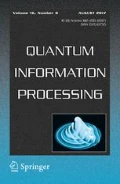Abstract
We highlight an information-theoretic meaning of quantum discord as the gap between the accessible information and the Holevo bound in the framework of ensemble of quantum states. This complementary relationship implies that a large amount of preexisting arguments about the evaluation of quantum discord can be directly applied to the accessible information and vice versa. For an ensemble of two pure qubit states, we show that one can avoid the optimization problem with the help of the Koashi–Winter relation. Further, for the general case (two mixed qubit states), we recover the main results presented by Fuchs and Caves (Phys Rev Lett 73:3047, 1994), but totally from the perspective of quantum discord. Following this line of thought, we also investigate the geometric discord as an indicator of quantumness of ensembles in detail. Finally, we give an example to elucidate the difference between quantum discord and geometric discord with respect to optimal measurement strategies.


Similar content being viewed by others
References
Ollivier, H., Zurek, W.H.: Quantum discord: a measure of the quantumness of correlations. Phys. Rev. Lett. 88, 017901 (2001)
Henderson, L., Vedral, V.: Classical, quantum and total correlations. J. Phys. A 34, 6899 (2001)
Modi, K., Brodutch, A., Cable, H., Paterek, T., Vedral, V.: The classical-quantum boundary for correlations: discord and related measures. Rev. Mod. Phys. 84, 1655 (2012)
Luo, S.: Quantum discord for two-qubit systems. Phys. Rev. A 77, 042303 (2008)
Ali, M., Rau, A.R.P., Alber, G.: Quantum discord for two-qubit X states. Phys. Rev. A 81, 042105 (2010)
Chen, Q., Zhang, C., Yu, S., Yi, X.X., Oh, C.H.: Quantum discord of two-qubit X states. Phys. Rev. A 84, 042313 (2011)
Fuchs, C.A.: Just Two Nonorthogonal Quantum States. arXiv:9810032
Fuchs, C.A., Caves, C.M.: Ensemble-dependent bounds for accessible information in quantum mechanics. Phys. Rev. Lett. 73, 3047 (1994)
Fuchs, C.A.: Distinguishability and accessible information in quantum theory. Ph.D. thesis, The University of New Mexico, Albuquerque, NM, 1996. arXiv:9601020
Fuchs, C.A., Sasaki, M.: Squeezing quantum information through a classical channel: measuring the “quantumness” of a set of quantum states. Quantum Inf. Comput. 3, 377 (2003)
Fuchs, C.A., Sasaki, M.: The quantumness of a set of quantum states. arXiv:0302108
Audenaert, K.M.R., Fuchs, C.A., King, C., Winter, A.: Multiplicativity of accessible fidelity and quantumness for sets of quantum states. Quantum Inf. Comput. 4, 1 (2004)
Fuchs, C.A., Peres, A.: Quantum-state disturbance versus information gain: uncertainty relations for quantum information. Phys. Rev. A 53, 2038 (1996)
Fuchs, C.A.: Information gain vs. state disturbance in quantum theory. Fortschr. Phys. 46, 535 (1998)
Horodecki, M., Horodecki, P., Horodecki, R., Piani, M.: Quantumness of ensemble from no-broadcasting principle. Int. J. Quantum. Inf. 4, 105 (2006)
Horodecki, M., Sen(De), A., Sen, U.: Quantification of quantum correlation of ensembles of states. Phys. Rev. A 75, 062329 (2007)
Luo, S., Li, N., Cao, X.: Relative entropy between quantum ensembles. Period. Math. Hung. 59, 223 (2009)
Luo, S., Li, N., Sun, W.: How quantum is a quantum ensemble? Quantum Inf. Process. 9, 711 (2010)
Luo, S., Li, N., Fu, S.: Quantumness of quantum ensembles. Theor. Math. Phys. 169, 1724 (2011)
Zhu, X., Pang, S., Wu, S., Liu, Q.: The classicality and quantumness of a quantum ensemble. Phys. Lett. A 375, 1855 (2011)
Kholevo, A.S.: Bounds for the quantity of information transmitted by a quantum communication channel. Prob. Peredachi Inf. 9, 3 (1973)
Kholevo, A.S.: Bounds for the quantity of information transmitted by a quantum communication channel. Prob. Inf. Transm. 9, 177 (1973)
Nielsen, M.A., Chuang, I.L.: Quantum Computation and Quantum Communication. Cambridge University Press, Cambridge (2000)
Davies, E.B.: Information and quantum measurement. IEEE Trans. Inf. Theory 24, 596 (1978)
Peres, A., Wootters, W.K.: Optimal detection of quantum information. Phys. Rev. Lett. 66, 1119 (1991)
Hausladen, P., Wootters, W.K.: A ‘pretty good’ measurement for distinguishing quantum states. J. Modern Opt. 41, 2385 (1994)
Jozsa, R., Robb, D., Wootters, W.K.: Lower bound for accessible information in quantum mechanics. Phys. Rev. A 49, 668 (1994)
Sasaki, M., Barnett, S.M., Jozsa, R., Osaki, M., Hirota, O.: Accessible information and optimal strategies for real symmetrical quantum sources. Phys. Rev. A 59, 3325 (1999)
Boixo, S., Aolita, L., Cavalcanti, D., Modi, K., Winter, A.: Quantum locking of classical correlations and quantum discord of classical-quantum states. Int. J. Quantum. Inf. 09, 1643 (2011)
Koashi, M., Winter, S.: Monogamy of quantum entanglement and other correlations. Phys. Rev. A 69, 022309 (2004)
Levitin, L.B.: Optimal quantum measurements for two pure and mixed states. In: Belavkin, V.P., Hirota, O., Hudson, R.L. (eds.) Quantum Communications and Measurement. Plenum Press, New York (1995)
Dakić, B., Vedral, V., Brukner, C̆.: Necessary and sufficient condition for nonzero quantum discord. Phys. Rev. Lett. 105, 190502 (2010)
Luo, S., Fu, S.: Geometric measure of quantum discord. Phys. Rev. A 82, 034302 (2010)
Yao, Y.: Quantum discord in quantum random access codes and its connection to dimension witnesses. Phys. Rev. A 86, 062310 (2012)
Acknowledgments
Y. Yao wishes to thank Prof. Shunlong Luo for his helpful comments and valuable suggestions. This work was supported by the National Natural Science Foundation of China (Grant Nos. 11121403, 10935010 and 11074261) and the National 973 Program (Grant Nos. 2012CB922104 and 2014CB921402).
Author information
Authors and Affiliations
Corresponding author
Rights and permissions
About this article
Cite this article
Yao, Y., Huang, JZ., Zou, XB. et al. Quantum discord of ensemble of quantum states. Quantum Inf Process 13, 1583–1594 (2014). https://doi.org/10.1007/s11128-014-0753-7
Received:
Accepted:
Published:
Issue Date:
DOI: https://doi.org/10.1007/s11128-014-0753-7


